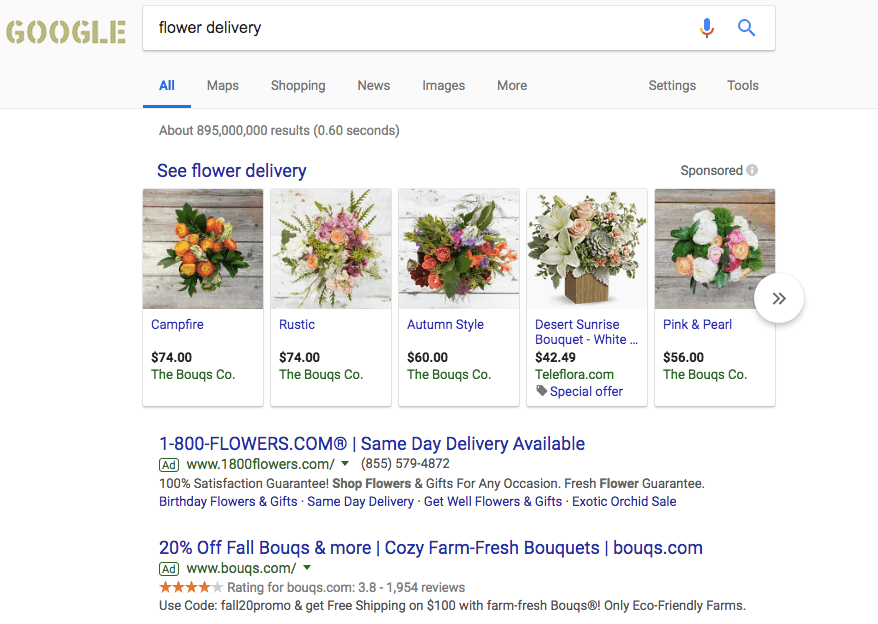1-800-Flowers And IBM Watson Take On The Future Of Gifting, And The Future Of Relationships

How will machine learning impact gifting as a retail business? 1-800-Flowers is partnering with Watson to innovate their customer experience.
1-800-Flowers is a gifting business that has always promised its customers the utmost convenience. Founded with a telephone-as-channel model, 1-800-Flowers has remained focused on distribution innovation, making a strong effort to keep pace with 21st century e-commerce trends [1]. While machine learning’s role in a flowers and gifting business are not immediately apparent, 1-800-Flowers sees customer service as one of its core value propositions [1], and is utilizing AI to ensure their customer interactions are not only positive but also productive.
In 2014, 1-800-Flowers made a strategic acquisition of Harry & David Holdings Inc. to formally diversify their product offering beyond flowers into gifting at large, bringing their combined annual revenue above $1B [2]. However, as 1-800-Flowers continues to evolve as a gifting business, they are feeling pressure to innovate from multiple angles. Direct-to-consumer e-commerce startups such as BloomThat, Urban Stems, and The Bouqs are challenging 1-800-Flowers’ core business line, elbowing for clicks in common google searches:
In addition, from a more macro-perspective, millennials are prioritizing experiences over material possessions [3], applying pressure on gifting retailers to be more creative in their offerings. To stay relevant and competitive in the face of these trends, 1-800-Flowers must remain digitally native while elevating their value proposition of personalization at scale. Chris McCann, their CEO, recognized this need: “Over the years that we’ve been in business it’s always about looking at the customer experience, and how do we recreate that same kind of one-to-one relationship we had in our local neighborhood flower shops many years ago” [1].
1-800-Flowers Partners with IBM Watson
In 2016, 1-800-Flowers announced a partnership with IBM, leveraging Watson’s technology to launch Gwyn, a personal gifting concierge [1]. In that same year, dozens of startups were raising venture capital money to develop virtual assistants [4], as big tech giants each refined their own voice technology: Amazon with Alexa, Apple with Siri, and Google with Home/Assistant. 1-800-Flowers anticipated the need to innovate beyond the traditional definition of convenience, mixing in quality and uniqueness.
They learned quickly that customers were willing to spend time chatting with Gwyn, asking up to 5-6 questions to get the right gift [5]. In the short term, 1-800-Flowers saw the potential for Gwyn to aid cross-selling across their multiple brands, pushing customers beyond the most expected gift options such as flowers [5]. 1-800-Flowers iterated on their UI to ensure that customers felt as comfortable conversing with Gwyn as they did in major chat apps such as WhatsApp or iMessage [5].
Looking Ahead: The Future of Customer Service, and of Relationships
Looking forward, 1-800-Flowers is focused on building Gwyn’s expertise and personalization, “shifting focus from an occasion-based gifting company to one that understands an occasion, the recipient and their relationship to them” [5]. In addition to recognizing the value of proactive and predictive analytics, rather than reactive, 1-800-Flowers is thinking about some of the more challenging tasks ahead for Gwyn. Given the emotional connotation of many occasions, 1-800-Flowers is carefully balancing Gwyn’s integration with their live customer experience team as the machine continues to learn.
1-800-Flowers leads a highly seasonal business. I recommend that they refine Gwyn’s expertise for the low hanging fruit occasions (i.e. birthdays, anniversaries, Mother’s/Father’s Day, Valentine’s Day.) Consumers today are used to getting a friend’s birthday reminder from Facebook, and 1-800-Flowers has the opportunity to productize this in the near-term.
In parallel, and more boldly, 1-800-Flowers has the opportunity to take a relationship-based approach to building out Gwyn’s learning. In other words, if Gwyn actively got to know a customer’s intimate social network, 1-800-Flowers will improve its gifting suggestions. As technology makes people more efficient and time becomes an even more valuable resource, adjacent startups like Hippo are also recognizing the need for help in “manag[ing] the relationships you care about and be[ing] more intentional with the people in your life” [6].
1-800-Flowers must also, however, balance the investment needed to continue partnering with IBM’s Watson with the potential return from their current business. I recommend they continue considering potential acquisitions to make their customer-experience muscle more efficient as a fixed cost across more, related business lines. For example, there is opportunity to grow their presence in the greeting card space, with startups such as LovePop taking a run at Hallmark. Additionally, there are experiential gifting businesses in beauty or travel that 1-800-Flowers should be considering.
One looming uncertainty is 1-800-Flowers’ ability to compete against Google, Amazon, Facebook or Apple in this realm, given its core product offering and talent pool. Does it make sense for 1-800-Flowers to continue investing in their own proprietary virtual assistant with IMB Watson when so much search volume and purchase intent is originating with big tech players already investing in and accelerating this customer-experience technology?
(791 words)
[1] IBM Watson Customer Engagement, “1-800-FLOWERS.com Innovates With The Help of Watson,” YouTube, published October 19, 2016, https://www.youtube.com/watch?time_continue=3&v=lo4K98P0lNk, accessed November 2018.
[2] Erin McCarthy, “1-800-Flowers to Acquire Harry & David for $143 Million,” Wall Street Journal, September 2, 2014, https://www.wsj.com/articles/1-800-flowers-to-acquire-harry-david-for-143-million-1409664467, accessed November 2018.
[3] Uptin Saiidi, “Millennials Are Prioritizing ‘Experiences’ Over Stuff,” CNBC, May 5, 2016, https://www.cnbc.com/2016/05/05/millennials-are-prioritizing-experiences-over-stuff.html, accessed November 2018.
[4] “From Scheduling Meetings To Health Advice: 21 Early-Stage Virtual Assistant Startups To Watch,” CB Insights Research Brief (June 2016), CB Insights, https://www.cbinsights.com/research/early-stage-virtual-assistant-startups/, accessed November 2018.
[5] Grace Caffyn, “What 1-800 Flowers Has Learned from Its Watson-Powered Concierge,” Digiday, February 20, 2017, https://digiday.com/uk/1-800-flowers-learned-watson-powered-concierge/, accessed November 2018.
[6] Hippo, homepage, https://www.heyhippo.io/, accessed November 2018.
*Featured image courtesy of Kim Kardashian’s Instagram.




Very interesting post! Regarding 1-800-FLOWER’s ability to compete with Amazon, Google, Facebook, or Apple, while I agree these companies are a threat, I also don’t believe they will spend a significant portion of their time on the fresh flowers / gift baskets business (at least not in the meantime). Additionally, the company’s access to data on what makes a good gift could give them the ability to develop an edge in the meantime. However, the other thought I had was does incorporating AI into the gift giving / relationship building business start to make these gifts less meaningful? I almost compare it to saying “Happy Birthday” on Facebook (due to the reminder). Does it start to mean less?
Thanks for picking such a unique topic! As a repeat customer of ProFlowers (competitor), I am intrigued to try out 1-800-Flowers now that I know about Gwyn. While I like getting advice about what kinds of flowers are appropriate for different occasions/types of recipients, I don’t like waiting for a customer service rep to get on the line. So Gwyn seems perfect!
What worries me however is the biased training data that may be fed into Gwyn. For example, in the US not many people send flowers for specific religious holidays like Diwali or Rosh Hashanah. If the system has not encountered these cultural corner cases, how will the interface react in such situations? My guess is I will get a response of ‘buy marigolds’ since it’s a decoration flower used in Diwali vs. one for gifting (similar to Watson confusing ‘Toronto’ to be a US city).
What a world…
My near perfect record of getting unwanted gifts may soon be coming to a close. I wish them Godspeed!
In all seriousness, this is a fascinating topic and I’m glad you picked it. I like Keeps you Guessings question above — would the app / AI be able to distinguish between whether you are a particular religion or other group that might impact which holidays you are more likely to celebrate?